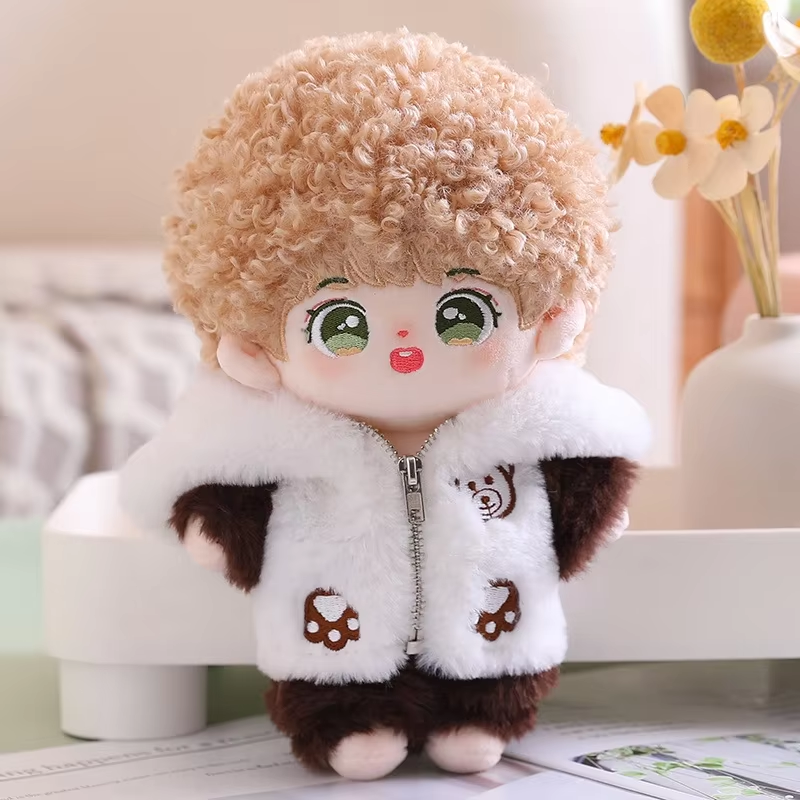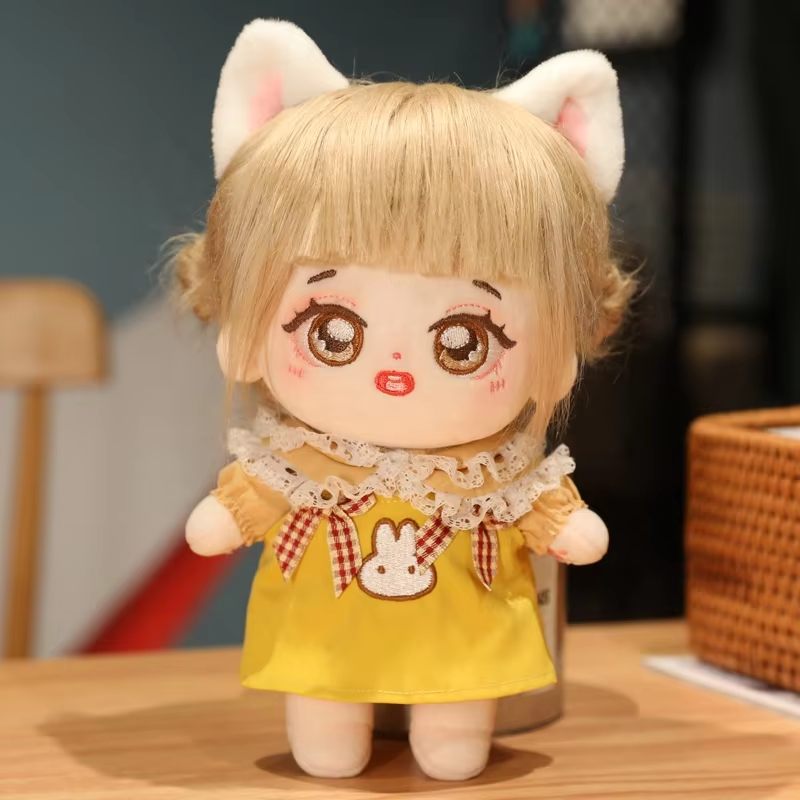Custom Cotton Plush Dolls vs. Synthetic: Which is Better?
Plush dolls have been beloved by children, collectors, and gift buyers for generations. Their soft textures, endearing designs, and emotional appeal make them a timeless product across cultures. But in recent years, the market for plush dolls has expanded into a new realm of customization, allowing individuals and brands to create unique designs tailored to specific tastes and purposes. Among the most popular choices for these personalized creations are Custom Cotton Plush Dolls and their synthetic counterparts.
Both types have their own strengths and drawbacks, and choosing between them requires an understanding of material properties, durability, safety, environmental impact, and cost. This article takes an in-depth look at the differences between Custom Cotton Plush Dolls and synthetic plush dolls, so you can make an informed decision whether you’re a business ordering in bulk or an individual commissioning a special piece.
Understanding Custom Cotton Plush Dolls
Custom Cotton Plush Dolls are made primarily from cotton fabrics, which may include organic cotton or cotton blends. Cotton is a natural fiber derived from the cotton plant, valued for its softness, breathability, and skin-friendly qualities. When used in plush dolls, cotton offers a comforting tactile feel and a more natural look compared to synthetic fabrics.
Because they are customizable, these dolls can be tailored to any shape, size, or design concept. This makes them ideal for personalized gifts, brand mascots, or themed merchandise. Many manufacturers offer choices in fabric texture, embroidery styles, stuffing firmness, and clothing design.
Understanding Synthetic Plush Dolls
Synthetic plush dolls are typically made from polyester, acrylic, nylon, or blends of synthetic fibers. These materials can be engineered to achieve a variety of textures, from ultra-soft “minky” plush to coarse, durable fabrics. Synthetic materials have been widely used in the toy industry because they are often more affordable, easy to dye in bright colors, and resistant to shrinking or wrinkling.
Like their cotton counterparts, synthetic plush dolls can be fully customized. Their adaptability to different colors and finishes means they can be produced to match nearly any artistic vision.
Softness and Comfort
Softness is one of the most important qualities in any plush doll.
Custom Cotton Plush Dolls: Cotton’s natural softness gives these dolls a warm, inviting feel. The texture can be especially soothing for children or anyone with sensitive skin. Cotton also tends to have a matte, understated finish that can make dolls look more artisanal.
Synthetic Plush Dolls: Depending on the fiber type and pile length, synthetic dolls can be made extremely soft — sometimes even softer than cotton. Modern microfiber polyester fabrics can mimic the luxurious feel of natural fur. However, some synthetics may feel slightly less breathable, which can make them warmer to the touch in hot conditions.
Durability and Longevity
A doll’s lifespan depends largely on the resilience of its materials.
Custom Cotton Plush Dolls: While cotton is strong, it can wear down with frequent washing or rough play. Over time, cotton fibers may pill or fade, especially if not properly cared for. However, high-quality cotton fabrics with tight weaves and reinforced stitching can last for years.
Synthetic Plush Dolls: Polyester and acrylic fibers are highly durable, resist shrinking, and maintain their colors well even after many washes. They are less prone to wrinkling and can withstand heavy use, making them a common choice for mass-produced toys intended for daily play.
Safety and Hypoallergenic Properties
Safety is paramount when designing plush dolls for children or people with allergies.
Custom Cotton Plush Dolls: Cotton is naturally hypoallergenic and gentle on the skin. Organic cotton versions are free from harmful dyes and pesticides, making them particularly suitable for infants and toddlers.
Synthetic Plush Dolls: While many synthetic fabrics are safe, some can cause mild irritation in people with sensitive skin. Additionally, low-quality synthetics may release microfibers during washing, which could pose environmental and health concerns. High-grade, certified-safe synthetic fabrics mitigate these issues.
Environmental Impact
Sustainability is a growing concern among consumers, and the choice between cotton and synthetic often comes down to environmental priorities.
Custom Cotton Plush Dolls: Cotton, especially organic cotton, is biodegradable and renewable. However, conventional cotton farming can be resource-intensive, requiring significant water and pesticide use. Choosing organic cotton reduces this impact.
Synthetic Plush Dolls: Made from petroleum-based materials, synthetics are non-biodegradable and contribute to microplastic pollution when washed. On the upside, some manufacturers are now using recycled polyester to create plush dolls, which helps reduce landfill waste and repurpose existing plastic.

Customization Possibilities
Both cotton and synthetic plush dolls can be highly customized, but the materials influence the range of available finishes.
Custom Cotton Plush Dolls: Ideal for designs with a natural, handmade appearance. Cotton takes embroidery well, holds prints in a soft, muted style, and suits earthy or pastel color palettes.
Synthetic Plush Dolls: Excellent for vibrant colors, glossy finishes, and complex textures. Polyester plush can mimic animal fur, create ultra-fluffy surfaces, or achieve shiny, satin-like effects.
Care and Maintenance
Ease of cleaning is important for toys intended for regular handling.
Custom Cotton Plush Dolls: Cotton can be machine washed, but care must be taken to avoid shrinking and color fading. Air drying is recommended to preserve the fabric’s shape.
Synthetic Plush Dolls: Generally machine washable and quick-drying. They resist shrinking and hold their shape well, making them easier to maintain over time.
Cost Considerations
Material choice plays a major role in production cost.
Custom Cotton Plush Dolls: High-quality cotton can be more expensive than basic synthetic fabrics, especially if using organic or specialty weaves. However, the perceived value of a natural material can justify higher retail pricing.
Synthetic Plush Dolls: Usually more cost-effective to produce in bulk. This makes them ideal for promotional giveaways or mass-market retail, though premium synthetic fabrics can still be costly.
Use Cases and Target Audiences
Understanding your end user helps determine which material is best.
Custom Cotton Plush Dolls: Well-suited for eco-conscious consumers, boutique toy brands, handmade gift markets, and products aimed at babies or people with sensitive skin.
Synthetic Plush Dolls: Ideal for colorful, bold designs, large-scale production runs, and situations where maximum durability is required, such as carnival prizes or corporate mascots.
The Emotional Factor
Many people choose Custom Cotton Plush Dolls because they evoke a sense of warmth, nostalgia, and authenticity. Cotton’s natural texture can make a doll feel more like a cherished heirloom than a mass-produced toy.
Synthetic plush dolls, on the other hand, can achieve a level of softness and visual appeal that feels indulgent and modern, appealing to a different emotional sensibility.
Making the Right Choice
Ultimately, the choice between Custom Cotton Plush Dolls and synthetic plush dolls depends on priorities:
If sustainability, skin-friendliness, and artisanal aesthetics are most important, cotton is the way to go.
If you value vibrant design possibilities, long-term durability, and cost-effectiveness, synthetics may be the better fit.
In many cases, a hybrid approach — using cotton for the doll’s outer body and synthetic fill for softness and shape retention — can offer the best of both worlds.
Conclusion
Custom Cotton Plush Dolls and synthetic plush dolls each bring unique qualities to the table. Cotton excels in natural comfort, hypoallergenic properties, and eco-friendly potential, while synthetics shine in durability, vivid color options, and lower production costs. The right choice will depend on the intended use, audience, and values of the buyer.
Whether you’re commissioning a one-of-a-kind keepsake or ordering a thousand units for retail, understanding these differences ensures your plush dolls meet both functional and emotional expectations. Customization adds an extra layer of personality, making the final product not just a toy, but a meaningful piece of art or branding.
FAQ
Are Custom Cotton Plush Dolls safe for babies?
Yes, especially if made from organic cotton and filled with non-toxic materials. Always ensure there are no small detachable parts.
Can synthetic plush dolls be eco-friendly?
Yes, if made from recycled polyester or other sustainable synthetic fibers, though they are still not biodegradable.
Which material holds color better?
Synthetic fabrics generally retain bright colors longer, while cotton offers a softer, more natural color tone.
Do Custom Cotton Plush Dolls cost more than synthetic ones?
Typically yes, due to higher raw material costs and artisanal production, but their perceived value can be higher as well.
Can I combine cotton and synthetic materials in one plush doll?
Absolutely. Many manufacturers blend the two to balance comfort, durability, and cost.
Table of Contents
- Custom Cotton Plush Dolls vs. Synthetic: Which is Better?
- Understanding Custom Cotton Plush Dolls
- Understanding Synthetic Plush Dolls
- Softness and Comfort
- Durability and Longevity
- Safety and Hypoallergenic Properties
- Environmental Impact
- Customization Possibilities
- Care and Maintenance
- Cost Considerations
- Use Cases and Target Audiences
- The Emotional Factor
- Making the Right Choice
- Conclusion
- FAQ


